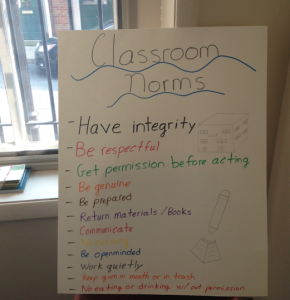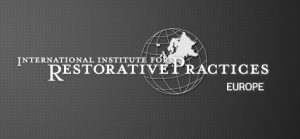News & Announcements
- Details
- Written by Laura Mirsky
 On the very first day at all Community Service Foundation and Buxmont Academy schools (demonstration programs of the International Institute for Restorative Practices Graduate School), students meet in circles to set “norms"(agreed-upon standards) for their school.
On the very first day at all Community Service Foundation and Buxmont Academy schools (demonstration programs of the International Institute for Restorative Practices Graduate School), students meet in circles to set “norms"(agreed-upon standards) for their school.
This starts off the school year with a restorative practice, doing things with students instead of telling them what to do. The thinking goes, if students set their own norms, they feel ownership and want to abide by them. They also feel responsible for holding their fellow students accountable to do the same.
Karen Engle, coordinator of the CSF Buxmont school in Bethlehem, Pennsylvania, USA, says staff engages students to come up with norms for their classroom, groups, lunch and school bus.
- Details
- Written by Joshua Wachtel
 The IIRP is consolidating many of its relationships in Europe to create a new initiative under the banner of IIRP Europe.
The IIRP is consolidating many of its relationships in Europe to create a new initiative under the banner of IIRP Europe.
With affiliates in the UK and Hungary, plus associates in the Netherlands, Sweden, Belgium, Spain and Portugal, IIRP President Ted Wachtel believed that Europe needed to have a regional identity under the global IIRP banner. Les Davey, CEO of IIRP Europe (formerly IIRP UK & Ireland) welcomed the move and said that it better represents the IIRP’s operations across Europe. Vidia Negrea, Director, Community Service Foundation of Hungary, said, “I think it is a great change with new possibilities to create a stronger presence in Europe.”
IIRP Europe's activities will initially be centered in the United Kingdom (UK) and the Republic of Ireland. The Basic Restorative Practices 4Day Event and the Restorative Responses to Grief, Trauma & Adversity 2Day Event are currently scheduled to take place for the first time in Europe in Manchester, United Kingdon, in September and November, respectively. The Restorative Leadership Development: Authority with Grace 2Day Event will be offered in London in February 2014. All of these events may be taken as stand-alone events, but they may also be applied toward graduate course credit with additional online course work.
Gradually there will be a rollout of these and other events in other countries across Europe. The Basic Restorative Practices event will also be available in Spanish and Portuguese, as these have already been translated for IIRP's work in Latin America. Contact IIRP Europe if you are interested in having these events come to your country.
- Details
- Written by Joshua Wachtel
Natalie DeFreitas, a mental health counselor and restorative justice advocate, delivers a great talk on restorative justice at TedXVancouver from 2012.
- Details
- Written by Joshua Wachtel
 Diane Lefer discusses restorative justice in Los Angeles schools in the LA ProgressiveThis post from the LA Progressive by Diane Lefer discusses a lot of the issues that are coming to the fore in many urban centers with regard to schools, including the failure of zero tolerance policies and the stigmatization of the "school-to-prison pipeline," often for minor offenses; the role of community activists in changing school policies; and restorative justice practices as a key to devising new solutions to legitimate concerns about discipline problems in schools and the lack of a safe, inclusive environment.
Diane Lefer discusses restorative justice in Los Angeles schools in the LA ProgressiveThis post from the LA Progressive by Diane Lefer discusses a lot of the issues that are coming to the fore in many urban centers with regard to schools, including the failure of zero tolerance policies and the stigmatization of the "school-to-prison pipeline," often for minor offenses; the role of community activists in changing school policies; and restorative justice practices as a key to devising new solutions to legitimate concerns about discipline problems in schools and the lack of a safe, inclusive environment.
I was particularly struck by this statement by Judge Donna Grosman that "school is the center of the community," which correlates very nicely with IIRP's notion of school-based restorative zones that radiate out into the community.
- Details
- Written by joshua Wachtel
 Hilary Davies, the restorative practices project manager for the city and county of Swansea, Wales, UK, wrote the following post to discuss the region's efforts to become a restorative city.
Hilary Davies, the restorative practices project manager for the city and county of Swansea, Wales, UK, wrote the following post to discuss the region's efforts to become a restorative city.
“It’ll change your life, it’ll change you!”
These are the opinions of Chelsea who was excluded from two comprehensive schools due to bad behaviour resulting in her being moved to a pupil referral unit. As the only girl out of 13 boys in the class, she found this tough, and there were times when she’d ‘kick off’ and retreat to the corner of the class. Following the training the staff received in Restorative Practice (RP), her form tutor, already passionate about using the approach, started using the question cards to deal with disputes in the class. Chelsea took to this immediately. Throughout the last few years, whenever there had been conflict in her mainstream school it had resulted in raised voices and anger between herself and staff, which achieved nothing more than her walking away frustrated about not being heard. Using RP and having an opportunity to talk about what happened has been a turning point in her attitude. She has consequently written to both headteachers of the schools she previously attended to apologise for her behaviour, describing how she now understands the impact her behaviour has had on others. Her story is very clear and sad, as she truly believes that if a restorative approach had been used in her mainstream schools she might still be there with her friends sitting exams and getting her qualifications, which is her desire but sadly not an option at present.
- Details
- Written by Joshua Wachtel
In the US and Canada, the failing policies of zero tolerance are giving way in many schools to restorative justice and restorative practices. These schools are demonstrating one after another that restorative practices can successfully reduce suspensions, expulsions and other punitive responses to wrongdoing. Schools using restorative justice address wrongdoing, but they do it in an inclusive way that does not stigmatize students but instead aims to teach and reintegrate them into regular school programming.
In the Kawartha Lakes region in central Ontario, Canada, the local newspaper (Kawartha.com) has reported on significant reductions in suspensions and expulsions at Trillium Lakelands District School Board, which in recent years implemented restorative practices on a district-wide basis.
- Details
- Written by Joshua Wachtel
After two years of preparation, the first issue of Restorative Justice: An International Journal (RJIJ), published by Hart Publishing, Oxford (UK), appeared earlier this year, and the second issue is now available electronically.
The official launch of RJIJ is September 5, 2013, at the European Society of Criminology Annual Conference, in Budapest, Hungary, featuring a lecture by Prof. Shadd Maruna, Queen's University Belfast, UK, entitled, "An Homage to Albert Eglash: Strengths Based Approaches to Restoration." All are welcome. Read a 2003 eForum article about Albert Eglash.
- Details
- Written by Joshua Wachtel
 Police from Belarus during restorative circle trainingSimon Saxton, Residential and Alternative Provisions Manager, and Jacqui Raynor, Police Inspector, both for North Yorkshire, UK, and trained as IIRP UK trainers, recently visited the Gomel region of the Republic of Belarus, under the auspices of the Chernobyl Children's Project (UK), to deliver restorative practices training.
Police from Belarus during restorative circle trainingSimon Saxton, Residential and Alternative Provisions Manager, and Jacqui Raynor, Police Inspector, both for North Yorkshire, UK, and trained as IIRP UK trainers, recently visited the Gomel region of the Republic of Belarus, under the auspices of the Chernobyl Children's Project (UK), to deliver restorative practices training.
Trainees received an introduction to restorative practices and circles training during the five-day visit in May, 2013. Participants included police officers assigned to juvenile correction services, as well as teachers and psychologists working primarily in vocational schools. A model circle was filmed and shown on local television.
- Details
- Written by Joshua Wachtel
 Photo by woodleywonderworks at Flickr Creative CommonsRoss Brenneman at EdWeek's "Rules for Engagement" blog reports on a recent pole, the "Phi Delta Kappa/Gallup annual national survey," that shows few Americans have heard of "Common Core Standards," which have been adopted by all but four states, and even fewer understand what they are.
Photo by woodleywonderworks at Flickr Creative CommonsRoss Brenneman at EdWeek's "Rules for Engagement" blog reports on a recent pole, the "Phi Delta Kappa/Gallup annual national survey," that shows few Americans have heard of "Common Core Standards," which have been adopted by all but four states, and even fewer understand what they are.
However, according to Brenneman, "There was huge support for the idea that schools should address social-emotional skills. Over 50 percent of respondents displayed strong agreement with the following statements:
- Details
- Written by Joshua Wachtel
 ArchDaily accompanied their interview of VanBuren with this photo, a redesign of a courtroom from one of VanBuren’s workshops courtesy of FOURM Design StudioThis piece caught my attention for a number of reasons, not least because it comes from such a surprising and fresh direction. In a recent article titled "Restorative Justice: An Interview with Deanna VanBuren," ArchDaily, a trade publication for architects and designers, notes that the group Architects, Designers and Planners for Social Responsibility (ADPSR) "is campaigning to have the [American Institute of Architects] forbid its members from designing prisons" as a form of protest against the punitive U.S. penal system.
ArchDaily accompanied their interview of VanBuren with this photo, a redesign of a courtroom from one of VanBuren’s workshops courtesy of FOURM Design StudioThis piece caught my attention for a number of reasons, not least because it comes from such a surprising and fresh direction. In a recent article titled "Restorative Justice: An Interview with Deanna VanBuren," ArchDaily, a trade publication for architects and designers, notes that the group Architects, Designers and Planners for Social Responsibility (ADPSR) "is campaigning to have the [American Institute of Architects] forbid its members from designing prisons" as a form of protest against the punitive U.S. penal system.
But the editors are pleased to have discovered the work of Deanna VanBuren of FOURM Design Studio, who says she is looking at "the question of how architects might actually change the system." Amazingly, she is doing so by looking at prison and court design through the lens of restorative justice and restorative practices.

Restorative Works Year in Review 2024 (PDF)
All our donors are acknowledged annually in Restorative Works.
